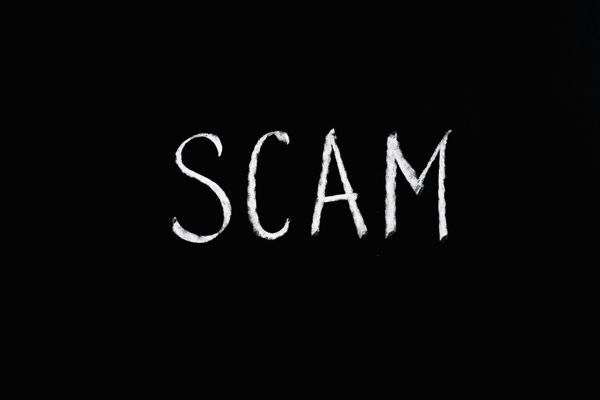Top 9 Utility Scams: Tips to Recognize and Avoid Them

Utility costs make up a significant part of many households' budgets. Unfortunately, scammers are always ready to take advantage when customers want to discuss their bills or find ways to save money.
Utility scams occur when scammers pretend to be representatives from utility companies, government agencies, or local authorities to steal your personal information or money. They might reach out to you through text messages, emails, phone calls, social media, or by showing up at your door. Tactics include making false claims about unpaid bills or presenting offers that seem too good to be true and require immediate acceptance. The main goal is to scare or pressure you into making quick decisions that could result in financial loss or disclosure of personal information.
Did you know?
- Utilities United Against Scams (UUAS) is a consortium of more than 150 U.S. and Canadian electric, water, and natural gas utilities and their respective trade associations. We recommend reading their comprehensive guide about how to stay safe from utility scams, which covers phone and in-person scams in addition to the internet scams mentioned in this article. You can find the guide, here.
- Utility scams are costing victims $239 million a year, according to abc7.com.
- In 2023, the FTC received fraud reports from 2.6 million consumers, with imposter scams (including utility scams) being the most commonly reported category. There were significant increases in reports of both business and government impersonators.
Most common utility scams you should know
1. Disconnection Scam. Fraudsters call you pretending to be from your utility company, threatening immediate disconnection of your service unless you make a payment immediately. They often demand payment via prepaid cards, credit cards, debit cards, bank drafts, and wiring money and insist you call back with the payment information. The scammers create a sense of urgency to pressure you into complying quickly without thinking it through.
Tip: Your utility company will send multiple disconnection notices via mail if your payment is past due, and they offer several payment options without specifying the type of payment required.
Related: Watch Out for These 6 Parking Scams
2. Overpayment Scam. Scammers may reach out to you, falsely claiming that you have overpaid your utility bill. They may request your personal bank account information or credit card number under the pretense of facilitating a refund. Their goal is to gain access to your financial information.
Tip: Legitimate utility companies usually credit any overpayments to your account balance or issue a refund via mailed check. Be cautious if someone requests your financial details in this context.
Related: How Hackers Hijack Hotel Accounts on Booking.com to Scam You.
3. Smishing Scam. Smishing, or SMS phishing, involves scammers sending text messages that appear to be from your utility company, tricking you into providing personal information. This scam can be particularly effective since text messages are often perceived as trustworthy.
Tip: Utility companies usually do not send texts unless you have signed up for specific notification services.
Related: Scammer phone number lookup. How to check if a phone number is a scam
4. Equipment or Repair Fee Fraud. In this scam, fraudsters may call and demand a separate payment for replacing or repairing utility-related equipment. They may insist that the payment is urgent and necessary to avoid service disruption.
Tip: Legitimate utility companies notify you in advance about any equipment upgrades or repairs and include any charges in your monthly bill.
Related: Advance Fee Scams: What They Are, How to Spot Them and Safety Tips
5. Bogus Bills. Beware of scammers sending fake utility bills via email. These emails often look like genuine bills, with company logos and colors, and may prompt you to click on links or open attachments.
Tip: Always verify the sender's email before clicking on any links or attachments. Usually, utility companies send bills through the mail, unless you've specifically requested email billing.
Related: Scammers Are Impersonating Federal Employees to Request Money Transfers, CISA Warns
6. Fake online ads. Scammers post ads pretending to be utility companies like DTE Energy. The ads are geolocated so that they are relevant to your location. When you click on these ads, you are directed to call a scammer directly instead of the actual company.
For example, you might search online for DTE Energy's customer service number and click on the ad that appears at the top of your search results. You may unknowingly call a scammer who asks for your account information and personal details, which can later be used for identity theft.
Tip: Always verify the contact information on your utility company's official website before making any calls.
Related: How to Tell the Difference Between a Holiday Scam and a Genuine Good Deal
7. Phishing Emails. Scammers often send fake emails that look like they're from legitimate utility companies, complete with fake email addresses, logos, and website links. If you click on any links or attachments in these emails, you could unknowingly download malware onto your computer.
Tip: Utility companies do not ask for sensitive information like Social Security numbers or bank details via email.
Related: How to Spot and Report Email Scams
8. Fake Credits. Criminals have been running a scam where they call customers and claim that the U.S. President is providing credits or applying payments to utility bills. They then ask the customers to provide their Social Security numbers to apply for the program. After obtaining the customers' information, the scammers provide a phony bank routing number for the customers to pay their utility bills or receive a credit on their bills. When the routing number is entered during an online transaction, it may appear that the customer's bill has been paid or the credit has been applied. However, in reality, no government funds have been actually applied to the customer's account, and the account balance remains unpaid.
The scammers also use email, text messages, and social media to reach out to potential victims.
Tip: Always verify offers with your utility company directly, as legitimate programs are usually well-publicized.
Related: How to Avoid Publishers Clearing House Scams Like a Real Winner
9. Solar Installation Scams. Fraudsters claim to be affiliated with your utility's preferred solar installers program to gain your trust and money. They might offer bogus discounts or demand upfront payments for installations that never happen.
Tip: Always verify any affiliations by contacting your utility company directly.
Related: 'Scam likely' calls. How they work and how you can block them
Key Signs of a Utility Scam
- Too good to be true offers: Be wary of offers promising significant savings or rebates way below market prices.
- Urgent payment requests: Scammers pressure their targets to transfer money quickly, often using fear tactics such as threats of immediate disconnection.
- Unusual Payment Methods: Legitimate utility companies will not ask for payment through gift cards, prepaid cards, payment apps, or money transfers.
- Requests for Personal Information: Genuine utility companies do not ask for your passwords, PINs, Social Security numbers, or bank details via phone or email.
How to Protect Yourself Against Utility Scams
Protect personal information. Do not provide or confirm personal information such as your Social Security number, date of birth, or financial information, including banking account details or credit card information, to anyone contacting you claiming to be from your utility company.
Is your personal information already on the Internet? Check now with Bitdefender Digital Identity Protection.
Take your time. Don't be rushed into making payments or giving away information. Call your utility company using the number on your bill to verify the legitimacy of that representative's email or SMS.
Always ask questions. Ask the person contacting you to provide you with your account number, your last payment amount, the date of payment, and their employee identification number. Legitimate representatives will have this information readily accessible; scammers won't.
Contact your utility company directly. If you receive suspicious contact, report it to your utility company and local police. This helps in potential criminal investigations and prevents others from falling victim.
Use Scamio, our free online scam checker tool. If you suspect someone is trying to scam you, check with Scamio, our AI-powered scam detection tool. Send any texts, messages, links, QR codes, or images to Scamio, which will analyze them to determine if they are part of a scam. Scamio is free and available on Facebook Messenger, WhatsApp, and your web browser. You can also help others stay safe by sharing Scamio with them in France, Germany, Spain, Italy, Romania, Australia, and the UK.
Get a mobile security solution that offers scam alerts. Bitdefender Mobile Security for Android or iOS will protect you against fraudulent links, phishing attempts, and malware infections you receive via SMS.
FAQs
What are the signs of a utility scam email?
Utility scam emails often contain urgent language, ask for personal or financial information, and may include links to fake websites. They often use spoofed email addresses and logos to appear legitimate. Always verify the sender before clicking on any links or attachments.
How can I verify the identity of a utility employee visiting or calling me?
Ask for identification and contact your utility company using a verified phone number to confirm the worker's identity. Genuine utility workers will have official identification and will not pressure you into making immediate payments or sharing personal information.
What should I do if I've already fallen victim to a utility scam?
Immediately contact your bank or credit card company to report the fraud and secure your accounts. Report the scam to your utility company and file a report with local law enforcement and the Federal Trade Commission (FTC) to aid in their investigations and help prevent future scams.
tags
Author
Cristina is a freelance writer and a mother of two living in Denmark. Her 15 years experience in communication includes developing content for tv, online, mobile apps, and a chatbot.
View all postsRight now Top posts
How to Protect Your WhatsApp from Hackers and Scammers – 8 Key Settings and Best Practices
April 03, 2025
Outpacing Cyberthreats: Bitdefender Together with Scuderia Ferrari HP in 2025
March 12, 2025
Streamjacking Scams On YouTube Leverage CS2 Pro Player Championships to Defraud Gamers
February 20, 2025
How to Identify and Protect Yourself from Gaming Laptop Scams
February 11, 2025
FOLLOW US ON SOCIAL MEDIA
You might also like
Bookmarks







